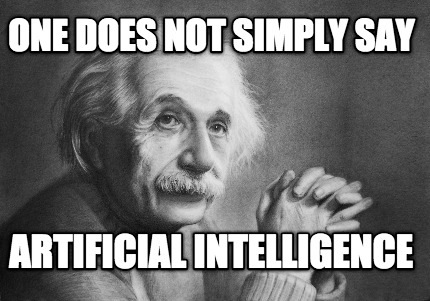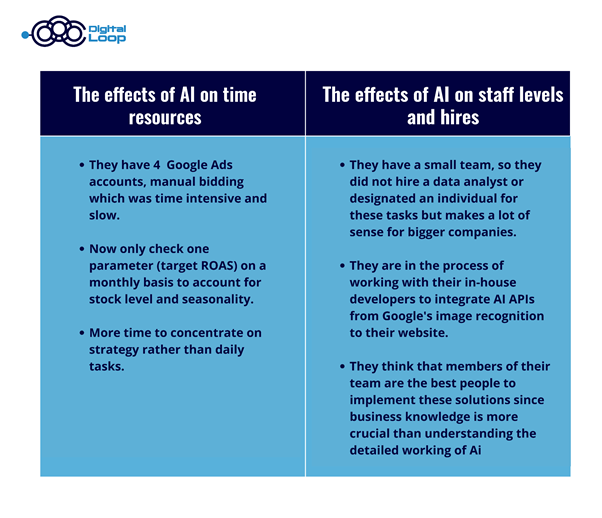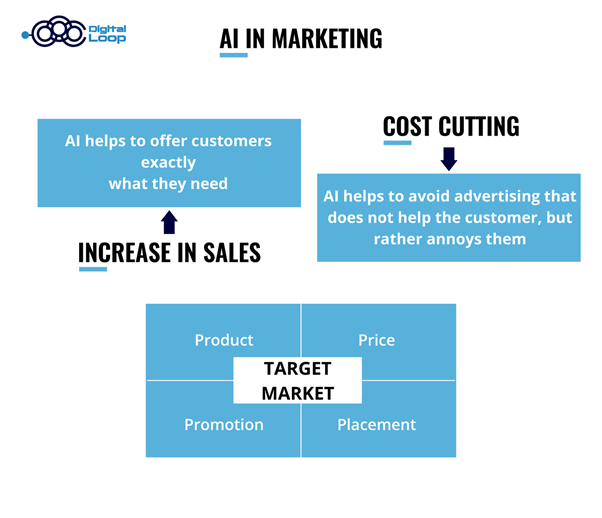Partner Content

Artificial intelligence (AI) can be used effectively in marketing with simple methods. For companies, AI offers great potential for optimization, especially in marketing. In this way, completion rates can be increased, customer behaviour can be predicted, and personalized advertising can be rolled out. Artificial intelligence has been used successfully in marketing for years, but at the same time many companies are only just beginning to use AI.
In this article, we will show you what artificial intelligence is, what opportunities present themselves in marketing through its use and demonstrate some applications of artificial intelligence in marketing. Also we will show a real case and an interview with Patrick Schammer, Director of Marketing at hemden.de. Over the last 6 years, he has been building up the whole digital marketing strategy there. He shows us exciting insights into how they can benefit from the potential of AI in marketing.
Why should you use artificial intelligence in Marketing?
The term artificial intelligence is an abstract term that covers a wide range of topics of computer science, machine learning, mathematics and statistics. Broadly speaking, artificial intelligence offers marketing numerous advantages in terms of customer centricity. Particular examples include the use of AI to increase sales and reduce marketing costs. The fields of application of artificial intelligence in marketing are diverse and range from price optimization using AI to chatbots to procedures for preventing dismissal.
AI in marketing means using algorithms to search in existing customer data for interesting patterns and relationships in order to make predictions about future customer behaviour and purchasing behaviour. These predictions and recommendations can then be used in a targeted manner in order to generate more sales through personalization and also to save costs through targeted control of marketing activities. AI is a branch of computer science and is based on machine learning methods, understanding of natural language, deep learning and reinforcement learning.
Our client Patrick Schammer works as Director of Marketing at hemden.de. He also uses AI for their marketing. The areas Patrick connects with AI are bidding strategies in Google Ads & Bing Ads for a better reach and higher conversions. AI is also used in marketing for budget optimization. Besides that, Patrick connects AI with E-commerce product listing because this is very time-intensive when done manually.
In which areas is AI used?
Artificial Intelligence offers many opportunities for being used in marketing. On the one hand, it has effects on time resources, on the other hand it can influence staff levels and hires. Patrick Schammer from hemden.de told us about some of these effects he recognizes at his department:
Which benefits do you get by using AI in marketing?
A McKinsey study shows that “organizations are using AI as a tool for generating value.” This fact shows how important AI is in marketing. Artificial intelligence in marketing has the following advantages for companies:
- Customer needs along the entire customer life cycle are better understood and individually addressed through personalized marketing. This leads to targeted marketing and stronger customer loyalty.
- Marketing budget is spent on the right customers who have a high customer value.
- Buying behaviour of customers can be predicted precisely and served proactively with campaigns at the right time.
- Critical patterns, such as customer churn, are recognized at an early stage. This enables marketers to act in good time and to retain customers for longer.
What makes marketers move to AI solutions in marketing processes?
AI in marketing has a lot of benefits, like mentioned before. In addition, here are some examples why marketers move to AI solutions when it comes to marketing processes:
- Speed: As Patrick from hemden.de mentioned, they need to move fast to compete with the big players like Zalando and AboutYou who have already implemented many automated processes to publish products faster.
- Freeing up resources: We have a small team which used to be preoccupied with repetitive daily tasks like ad bidding, but can now focus on the core business.
- Reduce costs: The points mentioned lead to an improved customer journey through relevant communication. At the same time, companies can save marketing costs by using the marketing budget for customer groups that have a higher customer value. As a result, sales can be increased with the same marketing budget.
- Increase sales: Artificial intelligence benefits not only within the marketing channels. Artificial intelligence methods can also be used in e-mail marketing or on-site in web shops to personalize the customer journey. The use of customer-centered marketing, which is precisely tailored to customer needs, can also lead to increased sales and improves customer loyalty.
- Making more intelligent decisions: With the availability of large amounts of data, AI solutions such as Google Ads smart bidding can make better decisions than human counterparts. Such algorithms have access to more variables, such as an individual user’s search history, and the ability to interpret them on a large scale.
I am very happy with our marketing efficiency. We can now get more impressions with ROAS bidding working really well.”
What is the process for implementing a new AI solution?
You first need a clear structure, target KPIs and clean data. Secondly, think about which tools you can use. Are SaaS solutions (Software as a Service (SaaS) is a sub-area of cloud computing) and existing APIs sufficient, or do you need to develop something for the specific use case? If a developer is involved, take time to explain the concepts and the business case. Technical knowledge is only one side of the coin.
It is easy to find a tool that recognizes the colour of one of our shirts, but it is much harder to find something ready-made that can also tell the colour of the buttons.”
When you want to implement a new kind of workflow like AI in marketing, it is not uncommon to have some misconceptions about this new technology. Patrick Schammer also got in touch with these at his working space. “Many consider AI to be a plug-and-play solution that can be integrated without much thought.” However, there is more to it: you should consider AI carefully before implementation. "Right now, no-code SaaS AI solutions are still in their infancy. Not every department has the appropriate tools. You should consider how optimized you want to be. Out-of-the-box AI solutions can increase efficiency, but cannot exploit the full potential of the technology. People underestimate the importance of good data entry. AI can only function well if it is supplied with sufficiently clean data. "
You need to have a clean (or good) structured ads account to let the AI do its job well.”
Which application examples for artificial intelligence in marketing are there?
Artificial intelligence is used in marketing for various tasks in order to optimize marketing processes, tailor targeting to the needs of customers and make the right offer at the right time. In the following, we will go into the individual application examples of artificial intelligence in marketing. Of course there are many more other use cases as well. In this article we will focus on these three most common ones.
Use Case # 1: Customer Lifetime Value Forecasting
The Customer Lifetime Value (CLV) is a very well-known concept from marketing management. The CLV includes the evaluation of customers according to their profitability and open potential.
Now you are probably thinking: How does the CLV relate to artificial intelligence? Quite simply: To calculate a reliable CLV, forecasts have to be made for the future; this is based on machine learning and is part of AI. A well-modelled CLV can predict very precisely how a customer will develop over the next 12 months. Marketing budgets and campaigns can then be planned much more precisely.
Some companies go one step further and calculate a CLV or sales forecast for every combination of customer and product group. In this way, cross- and up-selling potentials can be identified and used in certain product groups.
Use Case # 2: Chatbots learn to sell
Powerful AI algorithms make it possible to use chatbots as customer advisors and for sales preparation. Chatbots can advise customers in e-commerce and suggest suitable products through targeted queries.
On the one hand, this has the advantage that you can collect more data in the sales process and, on the other hand, the chatbots help customers find the right product. If the chatbot is intelligent enough and is even combined with a recommendation system, then this can become an individual shopping experience for shop visitors.
Use case # 3: Customer segmentation for marketing audiences
Customer segmentation through cluster algorithms are great application examples of artificial intelligence in marketing.
A cluster method is an unsupervised machine learning method; it is not trained on the basis of a target variable, but forms independent groups and thus subdivides the data set. The cluster method divides the customer base into a certain number of subgroups, that are as homogeneous as possible based on various (behavioural) variables. These subgroups can be distinguished from one another by characteristic patterns. For example, a customer base can be divided into 10-20 easily explainable groups.
Precisely described customer segments give marketing deep insights into the properties and behaviour patterns of the target group, so that these can be used for campaign optimization.
Conclusion: AI in marketing
Marketing experts around the world use AI in marketing to better understand, serve and retain their customers. In particular, further development of products, the customer journey and marketing campaigns lead to increased sales through improvements.
Artificial intelligence is rapidly developing. However, many possibilities only arise through an intelligent collection of customer data. Customer data is the fuel for AI. The more efficiently marketers use this data with the help of artificial intelligence, the better customer needs can be understood and acted upon in a customer-centred manner.
About Digital Loop
We at Digital Loop are the experts for your digital business. We provide companies with success-oriented recommendations for action, based on Data Analysis. Data enables us to develop strategies to better position companies in the market. We work on the grounds of personal consulting and implement technical skills. Our goal is to gain insights into the customer’s journey and keep them on the long-term by using integrated marketing techniques and analytics. To achieve this, we are experts in SEO-, CRO-Marketing, Content and Tracking, Personalization, eCommerce and Targeting. Since 2015 we have been successfully supporting numerous companies throughout Germany. Our goal is always to support companies to reach their best potential. Visit our website!


